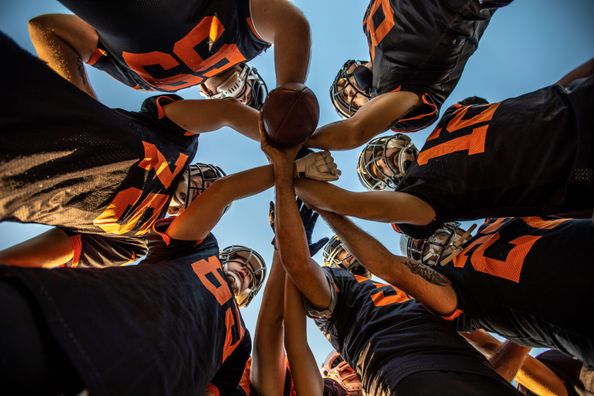As the school year kicks off and sports seasons begin, it’s essential for parents and guardians to actively support their young athletes. Quincy Medical Group (QMG) Sports Medicine Physician Dr. Anthony Biggs shares valuable information to help student-athletes succeed both on and off the field.
Common Sports Injuries
Q: What are the most common sports injuries you see in young athletes?
Dr. Biggs: The top five sports injuries I encounter are:
- Ankle sprains
- Osgood-Schlatter (Jumper’s knee) syndrome
- Knee sprains and other knee injuries
- Ankle and wrist fractures
- Head injuries
Q: How can parents help prevent sports injuries through diet and sleep?
Dr. Biggs: Pay attention to what your kids eat and drink, make sure they stay hydrated, and enforce adequate sleep and rest for them, especially when they’re in season. I always recommend kids eat mostly home cooked meals and that parents remove smartphones and other handheld electronics that may interrupt sleep from their athletes’ rooms before they go to bed. Younger individuals need 9 to 12 hours of uninterrupted sleep per night, and older kids need 8 to 10 hours of uninterrupted sleep per night.
Q: What role does rest and recovery play in preventing sports injuries?
Dr. Biggs: Many times, I’m informing parents that, for example, their daughter who participates in league softball, club volleyball, and traveling basketball games during the summer cannot also be doing strength and conditioning sessions for each separate sport and expect not to get an overuse type injury. We want parents (and coaches) to understand and promote appropriate rest and recovery intervals for athletes, especially during the “off-season” and especially for those playing in multiple sports. Telling athletes (and coaches) “no” to restrict participation at times is one way parents can advocate for the health and well-being of their student-athletes.
Q: How can parents help their child manage stress and mental health related to sports?
Dr. Biggs: At levels before high school varsity participation, training consistency and incremental skill development are much more important than winning. Allowing athletes the opportunity to grow their love for the game and respect for the processes are required for improving in their desired sport.
I tell parents that kids have no control over the talent of their coaches or the talent of their teammates. Too many kids are under pressure to win, primarily because they perceive winning as the only measure of success in sport. Because of this perception, we’re seeing younger kids presenting with increased levels of stress, anxiety and burn-out. These factors then affect how athletes experience, describe, and recover from their injuries.
Care at QMG
QMG offers a Free Sports Injury Clinic, open five days a week, providing free injury evaluations by an athletic trainer. No appointment is necessary. For more information, call (217) 228‑2323.
Hours: Monday – Friday
7 a.m. – 9 a.m.
Location: 1118 Hampshire, First Floor, Quincy, IL
Health Topics:







